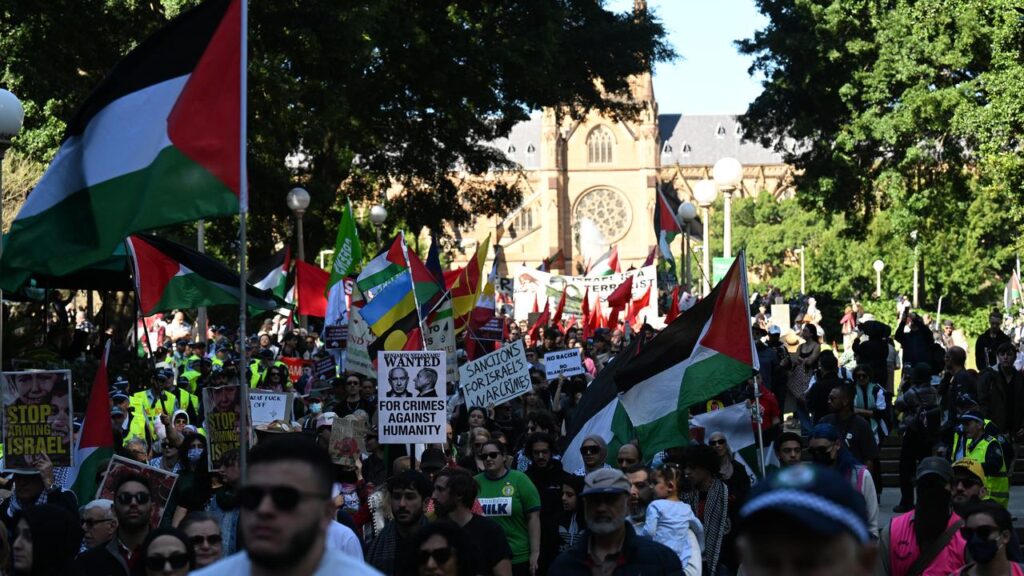Palestinian group condemns Trump’s Gaza ceasefire plan
Zac de Silva, Dominic Giannini and Melissa Meehan |

Australia has thrown its weight behind a US-brokered plan to end the war in Gaza, but some Palestinian advocates are criticising the proposal.
Donald Trump’s 20-point plan involves Israel and Hamas laying down their arms.
The deal, which has the backing of Israel’s government and some Arab countries, would include the release of Israeli hostages and Palestinian prisoners.
Mr Trump would lead a temporary authority alongside former British leader Tony Blair, to run the war-torn strip until elections can be held.
Prime Minister Anthony Albanese said he welcomed the peace plan, which he discussed with other world leaders during the past week while in the US and UK.
“Australia urges all parties to engage seriously with the plan and to work to bring its vision into reality without delay,” he said on Tuesday.
“Australia affirms the plan’s commitment to denying Hamas any role in the future governance of Gaza and calls on Hamas to agree to the plan, lay down its arms and release all remaining hostages.”
Australia-Palestine Advocacy Network president Nasser Mashni said the plan offered “no justice or peace … only more killing and dispossession”.
Mr Mashni argued there were no security guarantees for Palestinians because Gaza would be disarmed, while Israel would be allowed to keep its weapons.

He said the plan “cements external control, rather than empowering Palestinians to govern themselves”.
The US president’s proposal has the backing of Israel’s Prime Minister Benjamin Netanyahu, who said it achieved his country’s war aims.
“I support your plan to end the war in Gaza,” he told Mr Trump, describing the president as the “greatest friend that Israel” has ever had in the White House.
If Hamas doesn’t agree, Mr Trump said Israel would have his full backing “to finish the job of destroying the threat of Hamas”.
Israeli advocates in Australia also welcomed the proposal.
Australia/Israel and Jewish Affairs Council executive director Colin Rubenstein praised Mr Trump’s plan for its practicality and said it constituted “a clear end-game to the war”.
It’s not yet known if Hamas will sign up to the terms, but Liberal senator Dave Sharma suggests that’s unlikely.
“Hamas is being asked to sign its own extinction warrant here,” Senator Sharma told Nine’s Today program.
“But the leaders are being offered amnesty and a safe passage out of it – exile if you like.
“They’ve lost a lot of their senior military leadership, so it might be an attractive offer to some of them to take.”

The plan includes measures to encourage Palestinians to stay in the area and a surge in aid deliveries to Gaza.
The announcement comes days after Australia joined a clutch of nations to recognise a Palestinian state, amid growing international pressure on Israel to end what a UN inquiry commission has ruled as genocide in Gaza.
Almost 160 members of the 193-strong UN recognise Palestinian statehood, but Mr Trump was vocal against the recognition.
More than 65,000 people have been killed in Israel’s nearly two-year assault on Gaza, according to the local health ministry, after Hamas attacked Israel and killed 1200 people and took a further 250 hostage, according to Israeli tallies.
A majority of the dead in Gaza are civilians, including an estimated 18,000 children.
Israel rejects any accusations of genocide and denies starvation in the strip as deaths attributed to malnutrition and hunger-related deaths number in the hundreds, according to the Gaza health ministry and the UN.
AAP